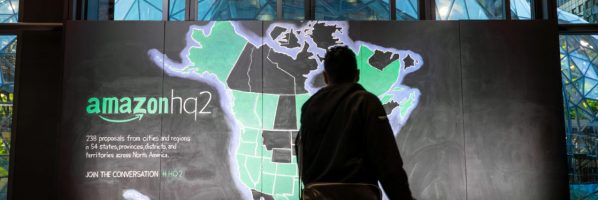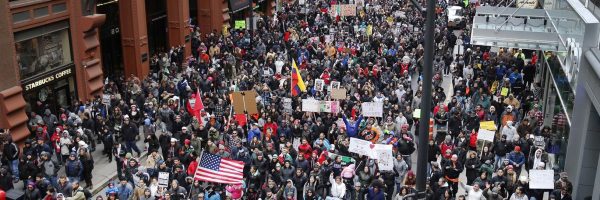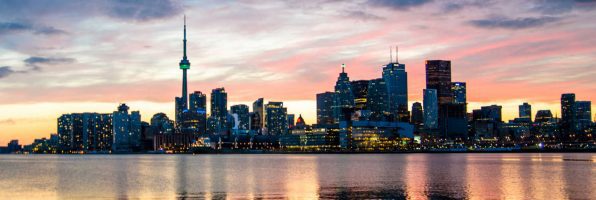The QS World MBA Tour Is Coming To Toronto

The QS World MBA Tour will be stopping in Toronto on Saturday, February 3, 2018.
Potential graduate school applicants attending these events will have an opportunity to connect with alumni from many of the most prestigious schools in the world, including the likes of The Wharton School at the University of Pennsylvania, Harvard Business School, the Stanford Graduates School of Business, and much more.
Details on the event website read as follows:
“The QS World MBA Tour gives you the opportunity to network with admissions directors and alumni from over 120 business schools around the globe. Our fairs feature top local and international business schools presenting a diverse range of programs to choose from and a chance to apply for a pool of exclusive MBA scholarships, totaling $7m [million]! The QS World MBA Tour takes place in 23 cities across the US and Canada; find an event in a city near you and discover the many benefits that an MBA has to offer.”
Registration and further details for the Toronto event can be found here. For those not in the metro, check out the rest of the QS World MBA Tour dates, listed below.
- Boston: Thursday, January 18, 2018 – 4:30 – 9 p.m.
- New York: Saturday, January 20, 2018 – 1:30 – 6 p.m.
- Washington DC: Tuesday, January 23, 2018 – 4:30 – 8:30 p.m.
- Chicago: Thursday, January 25, 2018 – 4:30 – 8:30 p.m.
- Los Angeles: Saturday, January 27, 2018 – 1:30 – 6 p.m.
- San Francisco: Sunday, January 28, 2018 – 1:30 – 6 p.m.
- Vancouver: Tuesday, January 30, 2018 – 4:30 – 9 p.m.
- Montreal: Thursday, February 1, 2018 – 4:30 – 9 p.m.
- Toronto: Saturday, February 3, 2018 – 1:30 – 6 p.m.
Registration and more information on the QS World MBA Tour events can be found here.
20 Cities Survive Amazon HQ2 Shortlist

Four months after Amazon announced plans to construct a second headquarters, North American cities have been making grandstanding pleas in order to court the ecommerce behemoth. New York City’s mayoral office lit up the Empire State building with Amazon’s glowing orange hue in a symbolic gesture, while certain cities like Chicago went the more extreme route, proposing laws that could funnel income taxes directly back to the company. After much speculation, here is the official Amazon HQ2 shortlist:
- Atlanta
- Austin
- Boston
- Chicago
- Columbus, Ohio
- Dallas
- Denver
- Indianapolis
- Los Angeles
- Miami
- Montgomery County, Md.
- Nashville
- Newark
- New York
- Northern Virginia
- Philadelphia
- Pittsburgh
- Raleigh, N.C.
- Toronto
- Washington, D.C.
Unsurprisingly, most of the cities that made the cut were among the largest in North America, with only one Canadian city—Toronto—left standing. Over 230 cities from the U.S., Canada, and Mexico made official bids for the company’s second headquarters, with Amazon prioritizing tech-centric metros of populations larger than 500,000. In fact, only four of the 20 metro areas—Miami, Nashville, Newark, and Pittsburgh—have a population of less than half a million, with Newark being the smallest of the entrants. Notably, Newark offered perhaps the largest financial incentive to the company, proposing upwards of $7 billion in tax incentives.
How the Amazon HQ2 shortlist was formed is not totally known, according to the New York Times:
“According to people briefed on the process who would speak only anonymously because the deliberations were private, the process was conducted by a team of about a dozen people within Amazon, including economists, human resources managers and executives who oversee real estate. Jeff Bezos, Amazon’s chief executive who was the mastermind behind turning the search into a public process and coined the term “HQ2,” was also involved, the people said.”
At the time of the initial announcement, Amazon released a stream of positive economic statistics about its impact in Seattle, home to the original headquarters. The company stated (although these statistics are still not yet verified by any source outside of Amazon) that it added $38 billion USD to the value of the city from 2010-16 alone, due to its investments and rapidly expanding workforce. Detractors argue that the financial value added to the city did not positively impact the quality of life, however, with more than 51 percent of Seattle residents making less than $50,000 per year and more than quarter of city residents earn less than $25,000 per year. The influx of high-level employment also contributed to rapidly rising housing costs and poorer traffic.
Experts from CNBC believe that Raleigh might be the front-runner of the remaining entrants, which matches the initial bid criteria the most. Although some speculate that Austin most aligns up with Amazon’s future. The company declined to announce when the final decision will be made.
What Amazon Means For MBA Students
Not so secretly, Amazon has become one of the world’s largest MBA recruiters, hiring students from top schools all over the world. We’ve previously outlined the details of why it has become such an attractive destination for business school students.
The company creates a direct pipeline from its MBA internship program to full-time employment, which should rapidly increase with the creation of HQ2. In a previous interview with the Financial Times, Miriam Park, the Amazon Director of University Programs, highlighted the company’s recruitment strategy:
“The Amazon recruitment process is designed to ensure we hire top candidates with high-growth potential whatever their background may be. As part of this we recruit current MBA students and MBA alumni for permanent and internship opportunities worldwide and see MBAs as an important part of our leadership development. We value people who can balance long-term strategic thinking with tactical execution, and who have the ability to make data-driven decisions.”
Stay tuned for more information about the second headquarters and more potential MBA employment opportunities with MetroMBA.
New Ryerson University Research Finds Immigrants Take Greater Business Risks

A new study from the Ted Rogers School of Management at Ryerson University investigates the role immigrant entrepreneurs play in global markets, finding that greater business risk does isn’t always worth the reward.
What Are The Most Valuable Toronto MBA Programs?

For prospective MBAs, looking at the price tag of earning a degree can be startling- and may even deter talented business leaders from pursuing an advanced education. The fear is certainly justified: an MBA from some of North America’s top business school can reach upwards of $100,000.
Yet, when considering the well-recorded increase that most professionals witness in their salary after earning an MBA, along with a greater likelihood of finding employment, the seemingly impossible cost of an MBA can seem more within reach.
Factors like the cost of a degree, salary increase after graduation and employment rate of graduates are all key numbers that must be considered together before one can determine the true cost of a degree. Below, we take a glance at these different numbers and round up the Toronto MBA programs that provide the best return on investment.
Ivey Business School – Western University Canada
The Ivey Business School at Western University Canada MBA program began in 1950, and has since established itself as one of the best offerings in the world. The business school’s rich legacy has been recognized again and again by the likes of Bloomberg, which touted its MBA as the 11th best international MBA program in 2017. Ivey, with its main teaching center on Western University’s campus in London, Ontario, offers a variety of MBA experiences, such as an full-time, Accelerated, and Executive MBA. The Tangerine Leadership Centre in Toronto’s downtown business district also offers EMBA courses through the Ivey Business School.
The full-time MBA at Ivey is a 12-month program that costs $88,250 to attend for domestic students and $101,500 USD for international applicants. According to the most recent Ivey employment report, about 91 percent of the 169 students in the Class of 2017 earned a job opportunity shortly after graduation, reporting an average salary of $103,560. More than one-third of the Class of 2017 also earned a singing bonus upon employment with a median value of $15,000. Signing bonuses for Ivey MBA grads ranged as high as $45,000 alone, proving that even with high price tag, the degree can immediately pay off.
Ivey Return on Investment (In USD)
| Ivey MBA Tuition | Median Signing Bonus | Median Annual Salary |
|---|---|---|
| $88,250 | $15,000 | $103,560 |
Schulich School of Business – York University
The Schulich School of Business at York University offers students a number of ways to pursue an advanced business education, from full-time, Executive, and International MBA programs as well as offering Master’s degrees in accounting, finance, business analytics, and more. The Schulich International MBA is the first of its kind in Canada, and the Kellogg-Schulich Executive MBA is North America’s first ever cross-border executive MBA degree. However, length of programs should be taken into consideration, since it will determine the time without a full-time income; an important distinction for students that are looking to enter the workforce as soon as possible. At 16-20 months, an MBA at Schulich will take slightly longer to earn than year-long programs like at Ivey.
Roughly 89 percent of graduates from Schulich’s MBA programs find a job within three months, earning an average base salary of $91,860 USD and an average singing bonus of $12,050. Full-time MBA students at Schulich will pay a tuition of $77,900 during the life of the degree, while part-time students pay $81,000. Meaning, grads typically earn about $10,000 more in their first year of employment than the entire cost of the program.
Schulich Return on Investment (In USD)
| Schulich MBA Tuition | Median Signing Bonus | Median Annual Salary |
|---|---|---|
| $77,900 | $12,050 | $91,860 |
Rotman School of Management – University of Toronto
The Rotman School of Management at the University of Toronto can boast of origins dating all the way back to 1901, when the university first established a diploma program in commerce. By 1972, the School of Business was an official part of the university, and hasn’t stopped growing since. Today, the Rotman School of Management has become universally recognized by the likes of Financial Times the and Bloomberg as one of the best business schools in the country. Located in downtown Toronto, Rotman offers a two-year, full-time MBA degree, but also more flexible options such as part-time morning and evening MBA programs, executive MBA, and an 18-month Global Executive MBA.
The two-year, full-time MBA tuition at Rotman comes with a price tag of $101,350 CAD ($74,999 USD). However, graduates—80 percent of whom typically find employment within three months after earning their degree—saw a median base salary of $85,000 and median signing bonus of $13,500. This salary increase seems to be typical of MBA graduates in Canada, so considerations of employment rate and program duration may be most important when evaluating Return on Investment for top programs in Canada.
Rotman Return on Investment (In USD)
| Rotman MBA Tuition | Median Signing Bonus | Median Annual Salary |
|---|---|---|
| $74,999 | $13,500 | $85,000 |
The QS World MBA Tour Is Coming To These Select Cities

There are few better opportunities to learn about the exemplary business school opportunities than at an MBA fair. And luckily, for many prospective MBA students, that opportunity will soon be arriving in their city with the QS World MBA Tour.
Ivey MBA Students Give Back to the Local Community Through #IveyConnects

#IveyConnects, a new student-run initiative at the Ivey Business School at Western University Canada, is bringing MBAs together to make an impact in the local community.
